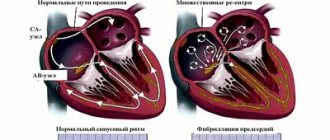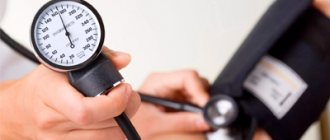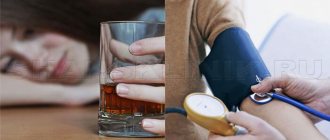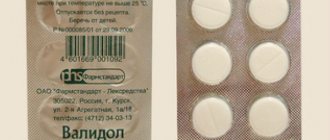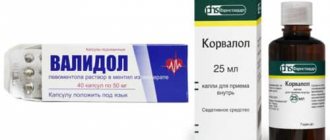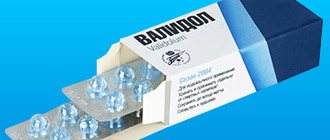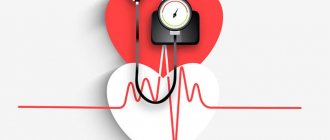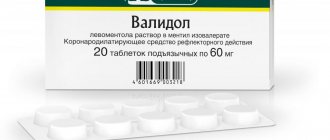Compatibility of Validol and alcohol
? Validol is prescribed for neuroses, diseases of the cardiovascular system, sleep disorders, and stress. They drink it to get rid of anxiety, fears and worries.
Often the purpose of drinking alcohol is to rest, relax, and not think about problems.
The active substance in the medicine is levomenthol solution in menthyl isovalerate. It dilates blood vessels and gives a calming effect.
Ethanol, entering the blood, increases the lumen of blood vessels and reduces the resistance of the vascular walls. Like the main substance, it has a vasodilating effect.
A one-time dose will increase the risk of side effects of the drug, minimize the therapeutic effect and worsen the patient's health.
It is forbidden to drink the drug with ethanol together. It is dangerous to mix medicine with alcohol if the patient has heart disease.
conclusions
So, alcohol and Validol have the opposite effect, so when they are combined, the body experiences additional stress on most systems. When taking pills in the midst of a feast, myocardial vessels may dilate, which will provoke acute cardialgia. Many experts do not recommend combining the drug with alcohol, since the consequences can be unpredictable.
Practice shows that in some patients, when combining these substances, the body became so relaxed that they lost the ability to control bowel movements and urination. No one wants to find themselves in such a situation, so it is better not to take risks and refuse such a combination.
You can take Validol only after alcohol has been removed from the body, and alcohol is allowed only 3-4 hours after taking the medicine.
Any, even the most “harmless” medicine requires a careful and responsible attitude, so before taking it, you must definitely talk to a specialist or at least read the attached instructions. Even herbal preparations may be incompatible with alcohol, so be smart.
Brief characteristics of the drug
“Validol” (Levomenthol) is a sedative in the form of tablets or liquid. Belongs to the group of reflex-vasodilators. The tablet is placed under the tongue, where it quickly dissolves and begins to act within 5 minutes.
The solution is available in ampoules of 5 milliliters. To take it, you need to drop 4-6 drops onto a piece of sugar and place it under your tongue until dissolved.
A drug:
- Reduces pain.
- Improves peripheral blood circulation.
- Relieves nervous tension and relieves spasm of heart vessels.
Indications:
- Pain in the left half of the chest, not associated with damage to the arteries of the heart;
- Disorder of the nervous system without anatomical changes in tissue;
- Attacks of angina, tachycardia
- Rapid heartbeat, irregular heart rhythm;
- State of hysteria;
- Neuroendocrine regulation disorders;
- Toxicosis in pregnant women;
- Hangover syndrome (as an aid).
Contraindications:
- Age under 14 years.
- Chronic alcoholism.
- Intolerance to the components of the drug.
- Low blood pressure in chronic form.
- Diabetes mellitus of the first, second type.
- Acute myocardial infarction.
Side effects:
- Nausea, vomiting, poisoning in case of overdose;
- Tearfulness, increased saliva production;
- A sharp decrease in blood pressure;
- Dizziness, headache;
- A sharp drop in vascular tone;
- Fainting, slow reactions.
Side effects after administration are rare.
Use of the drug for alcoholism
Alcoholism is a contraindication to taking the drug. The combination of substances disrupts the functioning of all organs.
There is a dilatation of the blood vessels of the heart with the development of pain.
The body of chronically addicted people is so exhausted that mixing will lead to unexpected consequences:
- Involuntary urination and defecation.
- Complete loss of control and conscious state.
- Severe poisoning.
The drug is metabolized in the liver and excreted by the kidneys in the form of glucuronides. If the exocrine gland is sick and the medicine is mixed with ethyl alcohol, the condition of the liver can worsen to a sharply critical level.
When treating people with alcohol addiction, you need to consult a doctor. He will tell you how long you need to abstain from alcohol before starting treatment, and after how long you can take the drug.
Using the drug for a hangover
It is taken during the post-intoxication period after drinking alcoholic beverages. But hangover medicine doesn't help much.
Action for hangover syndrome:
- Removes unpleasant odors from the mouth;
- Relieves mild headaches;
- Removes attacks of nausea;
- Reduces heart pain;
- Reduces Hell.
It may have unpredictable effects when used during a hangover. Alcohol breakdown products still circulate in the blood, which have a bad effect on internal organs.
Taking the drug can provoke an exacerbation of nervous and cardiovascular diseases.
Consequences of drinking alcohol
The most harmless thing that can happen when mixed with an alcoholic drink is the neutralization of the medicinal effect.
But probably:
- The occurrence of side effects of the drug.
- Severe poisoning of the body, intoxication.
- Dysfunction of internal organs.
The sedative effect of the drug in combination with ethanol will lead to very slow reactions, confusion and fainting. Blood pressure may drop to critical levels.
Symptoms of poisoning appear as:
- Severe vomiting;
- Dizziness;
- Excessive salivation and tearing;
- Swelling, skin rashes;
- Depression of the central nervous system.
Drinking alcohol together with the drug when contraindicated leads to aggravation of existing diseases, kidney and liver failure, and sometimes death.
Does the combination help get rid of unpleasant symptoms?
First of all, alcohol-containing products, as well as this medication, help increase the volume of blood vessels. Therefore, instead of a calming effect, you can get increased anxiety and anxiety. In addition, the action of validol is aimed at eliminating discomfort in the heart area. The medicine can be easily purchased without a doctor's prescription. Some people experience discomfort in the heart area after consuming products containing ethanol. This is due to the fact that such drinks can increase the volume of blood vessels only for a short time. They then narrow, which leads to discomfort and increased heart rate. A person seeks to eliminate these symptoms with the help of a drug. However, you should remember the dangers of combining validol and alcohol. The compatibility of these substances is poor.
Validol and beer
It is strictly forbidden to combine Validol with alcohol to normalize cardiovascular activity.
Consequences of one-time use:
- lack of therapeutic effect;
- slow reactions;
- critical decrease in blood pressure;
- nausea syndrome;
- dizziness;
- excessive salivation and tearing;
- allergic reactions in the form of urticaria, itching, swelling.
You can take the drug only after the breakdown products of alcohol have been completely removed from the body; the form of the drug does not matter. In rare cases it leads to death.
Organs affected by the toxin
The combined use of pharmacological agents and alcohol has a toxic effect on the internal organs and environments of the body. Alcohol, entering into a chemical reaction with a medicine, leads to poisoning, disrupts physiological processes, enhances or weakens the healing properties of drugs.
The liver suffers more than other organs. She gets hit twice. Many medications have a side effect - hepatotoxicity, destroy cells, and disrupt the physiology of the organ. In the liver, alcohol breaks down to ethanal, a substance 20-30 times more toxic than ethanol, which causes the death of hepatocytes.
Dangerous groups of drugs for the organ in combination with alcohol:
- Anti-inflammatory;
- Hormonal;
- Antibacterial;
- Antifungal;
- Glucose control agents for diabetes mellitus;
- Antituberculosis;
- Cytostatics (chemotherapy drugs);
- Tranquilizers (anti-epileptic, psychotropic).
In second place among the internal organs exposed to the harmful effects of alcohol together with medications are the heart and vascular system. Strong drinks during drug therapy constrict blood vessels and increase blood pressure. The simultaneous intake of alcohol and chemical substances leads to failure of the myocardium and increases the risk of developing an attack of angina pectoris and a heart attack.
A mixture of ethanol and pharmaceuticals disrupts the quality of the blood and reduces clotting. This is dangerous due to internal bleeding and strokes.
Why is it important to be careful?
Many patients believe that this remedy is weak. In their opinion, the medication does not have a strong effect on the functioning of the heart and blood vessels. Therefore, it is not prescribed to prevent the development of severe pathologies, such as stroke. However, validol can reduce heart rate.
Due to this property, the drug is often used for increased anxiety and neuroses. Many people mistakenly believe that alcohol helps cope with emotional stress. To enhance the calming effect, some people take Validol with alcohol. Is it possible to allow such a combination? Contrary to popular belief, products containing ethanol provoke arousal rather than relaxation. Considering that the medication has a sedative effect, the simultaneous use of these substances is not harmless. What happens if you take validol and alcohol?
Rules for taking medications and alcohol
Drinking alcohol during treatment minimizes the clinical effect of therapy and creates a risk of developing complications of the disease.
If this cannot be avoided, follow the rules of behavior that will reduce the consequences:
- Do not drink strong drinks (vodka, cognac, whiskey), choose dry wine (100-150 ml), beer (no more than 300 ml). Don't drink alcohol on an empty stomach.
- The interval between taking the medicine and alcohol should be at least 2 hours.
- To reduce the toxic effect, take medications that protect the liver (hepatoprotectors), pancreas (pancreatin), and stomach (antacids ─ Rennie, Almagel).
If a person takes antiviral medications for colds, anti-inflammatory drugs, alcohol in moderation does not pose a threat to the body.
Alcoholic drinks during treatment are contraindicated in cases of liver cirrhosis, severe infectious diseases, and during a course of chemotherapy.
How to behave if discomfort increases?
You should not rely on chance and assume that drinking a small dose of beer in the morning and a validol tablet in the evening will not cause harm to your health. The body's reactions are individual for each patient, and one can never predict how dangerous such a combination will be. If, after all, a person has made such a mistake as taking validol and alcohol together, he should be extremely careful about his well-being.
A slight increase in discomfort in the heart area and mild dizziness can be tolerated. Simply lie down and rest for a few minutes. If the patient's condition does not improve, he is advised to call an ambulance. Particular caution should be exercised in relation to persons with pathologies of the heart and blood vessels. Even during periods when their condition is stable, the combination of alcoholic beverages and medications for the treatment of heart disease can cause damage to the body. This person may require inpatient therapy.
Medicines, alcohol and chronic diseases
If a person has chronic diseases, simultaneous use of alcohol and medications is potentially dangerous for the functioning of vital organs. Since patients systematically take prescribed medications, the influence of alcohol can lead to negative consequences.
People with chronic heart disease (angina pectoris, heart defects) develop arrhythmias of varying severity. Heart attacks with severe pain syndrome develop, which is not relieved by Nitroglycerin, and the risk of developing myocardial infarction increases significantly.
In case of chronic liver diseases (viral hepatitis, hepatosis), alcohol during treatment will become a trigger in the development of cirrhosis and hepatocellular carcinoma (cancer).
Drinking alcohol during cirrhosis leads to the following consequences:
- Bleeding into the abdominal cavity;
- Liver decomposition, infection, peritonitis;
- Hepatic coma;
- Death.
If a person is on long-term treatment with sedatives, psychotropic drugs, tranquilizers, he is contraindicated in drinking alcohol. This leads to severe depression and the appearance of obsessive states (hallucinations, phobias). Suicidal feelings develop. The patient needs constant monitoring and assistance from a psychiatrist.
The most dangerous combinations and consequences
The combination of alcohol and chemical-based drugs leads to serious disorders in the body, and sometimes to fatal consequences.
List of medications and their side effects in combination with alcohol:
| Name of group, drug | Negative results of interaction |
| Neuroleptics (tranquilizers, anticonvulsants, hypnotics) | Severe intoxication, up to cerebral coma |
| CNS stimulants (Theophedrine, Ephedrine, Caffeine) | Rapid increase in blood pressure, hypertensive crisis |
| Antihypertensives (Captofrin, Enalapril, Enap-N), diuretics (Indapamide, Furosemide) | Sudden drop in pressure, collapse |
| Analgesics, anti-inflammatory | Increased toxic substances in the blood, general poisoning of the body |
| Acetylsalicylic acid (Aspirin) | Acute gastritis, perforation of gastric ulcer and 12-PC |
| Paracetamol | Toxic liver damage |
| Hypoglycemic (Glibenclamide, Glipizide, Metformin, Phenformin), insulin | A sharp decrease in blood sugar levels, hypoglycemic coma |
The effect of Corvalol on the human body
Corvalol is a broad-spectrum drug. The product is actively used in medicine and finds its place in the home medicine cabinet of almost every family. The effectiveness of Corvalol is explained by the components included in its composition. The combination of valeric acid ester and ethyl has a sedative effect, sodium phenobarbital helps to calm the nervous system and also has a vasodilator property, peppermint oil demonstrates antispasmodic and anti-inflammatory effects.
The effect of the medication on the body depends on the dose taken by the patient. For example, as a treatment for heart problems, doctors consider 15 to 30 drops of medication sufficient for adults. For children, the recommended dosage should be reduced to 15 drops.
